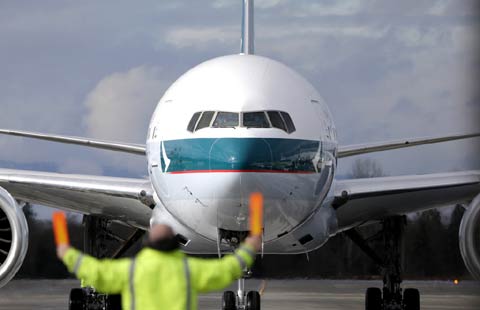China's "Road and Belt" initiatives to bring new momentum to world growth
(Xinhua) Updated: 2015-04-14 15:21BEIJING - China's Belt and Road initiatives are welcomed by officials and experts worldwide, who believe they would inject new momentum into the economies in Asia and beyond, and promote win-win cooperation between China and many other countries.
Put forward by Chinese President Xi Jinping during his overseas visits in 2013, the initiatives include the Silk Road Economic Belt -- from China via Central Asia and Russia to Europe, and the 21st Century Maritime Silk Road -- through the Strait of Malacca to India, the Middle East and East Africa.
The initiatives will provide new opportunities for Myanmar in its economic development efforts, Myanmar's presidential spokesman U Ye Htut said Thursday in an interview with Xinhua.
U Ye Htut, who is also the minister of information, said President Thein Sein expressed his welcome of China's advocacy of the "Belt and Road" initiatives during his visit to China.
"When President Thein Sein visited China and discussed with Chinese leaders, he said Myanmar welcomes the Belt and Road initiatives. I think that the initiatives will bring new economic opportunities to Myanmar and its people," said the spokesman.
Singaporean Prime Minister Lee Hsien Loong also hailed the initiatives as "positive."
"I think these are positive proposals by China to cooperate with the countries in the region along Southeast Asia and South Asia and also to Central Asia, to Europe," Lee said Friday at the two-day "Singapore Forum 2015" which concluded Saturday.
The United Arab Emirates (UAE) is also trying to play a unique role in China's "Belt and Road" initiatives by expanding its industrial free zones and markets.
Mohammed Al-Gergawi Fahad Al-Gergawi, CEO of Dubai's foreign direct investment office, said the UAE had itself "perfectly positioned" to be part of the new Belt and Road initiatives.
On March 28, China published an action plan for its Belt and Road initiatives based on the four principles of openness and cooperation; harmony and inclusiveness; market operation; and mutual benefit, emphasizing policy coordination, connectivity, unimpeded trade, financial integration and people-to-people bonds.
The historic plan will have dramatic implications for the entire Asian Region and many other parts of the world as well, Robert Hormats, former US undersecretary of state for economic growth, energy and the environment, said in a recent interview with Xinhua.
- China plays crucial role in advancing South-South cooperation
- Asian business aviation show opens in Shanghai
- China's fixed asset investment up 13.5%
- Beijing's high-end residential sector faces downward pressure in 2015
- China's property investment up 8.5% in Q1
- Singapore businesses to benefit from the 'Belt and Road'
- China Q1 retail sales up 10.6%
- China's Q1 industrial output up 6.4%

















